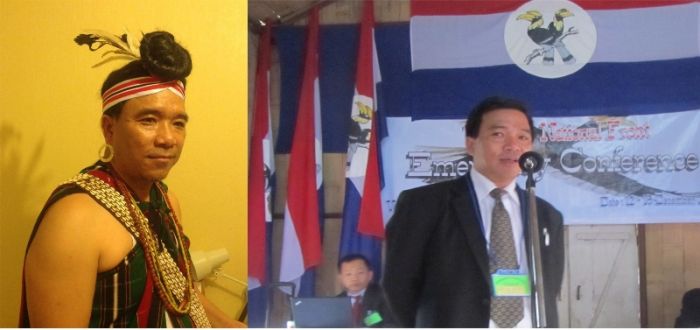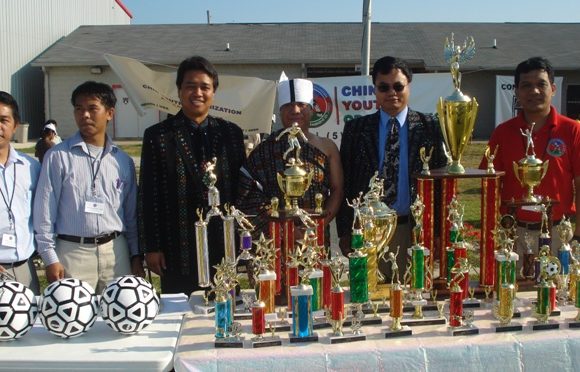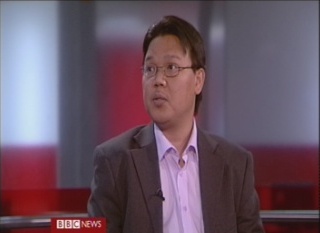Time to learn and change wrong policies for Burma: Interview with Salai Thang Ling Kee Dai

Time to learn and change wrong policies for Burma: Interview with Salai Thang Ling Kee Dai
[CG note: Salai Thang Ling Kee Dai, who lives in Norway with his wife and four children, left Burma in 1996 after retiring from the police force. He fled to India and finished his first biblical study course in Aizawl, Mizoram State of India. Then, he completed his bachelor’s degree in Theology at the India Harvest Bible Institute in New Delhi and now is doing health and social study as a final year student at a higher secondary school in Norway.
In Burma, he served as a Burma Police Force constable at Thuklai in Tedim Township in Chin State. Born in Shihying village, Mindat Township in 1970, he was brought up in a farming family having 12 siblings, children of Pu Thang Ling, aka Leng Ling Thang, chairman of the village council from 1978 to 1988, and Pi Hung Hlu.
Salai Thang Ling Kee Dai had also served as president of the Cho Youth Association, an executive member of the All Burma Students Parent Committee, treasurer of the Chin Refugee Committee and, for one term, chairman of the Buremse Christian Association in Delhi. In 2012, he was selected a member of the Chin National Front Supreme Council.]
Chinland Guardian: When did you leave Burma and why?
Salai Thang Ling Kee Dai: In 1996, I retired from the police force and left Burma for India because of injustice, unfair and discriminatory practices among us in my work place. I came to India to join Chin political organizations. Sometimes, police arrested civilians who attended the night church services in Chin State. And I was often denied to take part in the cross destruction operations and to go for patrolling because, as a Christian, it was not possible for me to destroy the cross which was erected by the local Christians. Therefore, I felt that I was discriminated against by police officers when it came to promotion.
Chinland Guardian: Why did you want to join Chin political organizations?
Salai Thang Ling Kee Dai: Because I understood that it was impossible for me to oppose such unfair and unjust system as a person on my own but I believed that it was possible for us, the Chin as a whole, to do so.
Chinland Guardian: Were you afraid of anything in Burma, to the extent of fearing for your life at that time?
Salai Thang Ling Kee Dai: Of course, I was afraid of the military regime because, at that time, they just arrested all the people who were against them, not necessarily against the country, Burma. As soon as I arrived in Aizawl, Mizoram State of India, I contacted the office of the National League of Democracy (exile). It was mainly because we didn’t have any Chin media groups that I knew. And to be honest, Rev. Thang Za Kap took me to meet with DVB journalists who were at the NLD (National League for Democracy) office in Aizawl. At the same time, The All Burma Students’ Democratic Front (ABSDF), a resistance group against the military regime in Burma, ran a Burmese basic school. Therefore, I went to the NLD office. I was interviewed by Dr. Lawma and Ko Kyaw Moe, who were journalists working for the Democratic Voice of Burma. Eventually, I sent my daughter to their school.
Chinland Guardian: We learned that you worked as a police constable in Tedim Township. What were your main duties?
Salai Thang Ling Kee Dai: I worked at the Tedim Township Police Office in Tedim town as a clerk. My main duty was to register the official letters which had come in and out.
Chinland Guardian: During your work as a police constable in Tedim Township, did you know about opium plantation in Chin State?
Salai Thang Ling Kee Dai: I often heard about it. And I personally met Chin police officers who took part in eradicating opium plantation in Chin State. Let me mention a few:
• The late Police Constable Pu Shein Ni San, from Mindat, destroyed opium plantation in Dongva area, Hakha Township under the authorities’ directives. At that time, U Ni Than, a Burman, was Chin State Police Commissioner. It was destroyed in the 1980s. Now, the policeman who destroyed the opium plantation, along with Shein Ni San, is still alive. He told me that opium planters paid a lot of money to the police. But Shein Ni San turned it down and was involved in the destruction of the opium cultivation. I believe the destruction was more than an acre.
• The late Police Corporal Pu Mawng Tam, from Mindat, destroyed opium plantation near Taingen, Tedim Township in the 1980s. He told me that he often destroyed opium in Taingen area. I think that some of the policemen who served at Thukhlai in Tedim Township and the Tonzang police station would be able to explain more about this.
• Police Corporal Pu Thang Phawi destroyed opium plantation at Phaitu area, Tonzang Township. Soon after, he was attacked with a sword by the opium planter. It happened at night in 1994 while he was on his way to a toilet, outside the house, in the village he had destroyed the plantation. He got serious injuries in his right hand and in his eyes. And since then, he has been disabled.
Chinland Guardian: Have you travelled to any area of the opium plantations?
Salai Thang Ling Kee Dai: No. I never did. But, the State government never responded although I often heard of Chin people in the area complaining about the issue. Still, it is very difficult for me to prove what the situation was , as I would need to show documents regarding this opium plantation in Chin State.
Chinland Guardian: Did you know what happened to the attacker of Pu Thang Phawi? Did the government take any action at all?
Salai Thang Ling Kee Dai: I heard that the government did not take any action against the attacker because he fled to India after the incident.
Chinland Guardian: We learned that the government wanted and is willing to keep it secret until today. What’s your view?
Salai Thang Ling Kee Dai: Yes, we can say that the government is willing to keep it secret until today because they have never taken any effective action to eradicate opium plantation in Chin State. If they actually wanted to, they could. However, I think they have this secret policy regarding ethnic minorities in the country. If not so, they could have eradicated it effectively.
Chinland Guardian: We also knew that the government had a plan to plant poppies in Chin State around the 1980s. But Chin University students opposed it.
Salai Thang Ling Kee Dai: It was in 1973 according to Salai Kipp Kho Lian. From that time, opium poppy was planted secretly in some parts of northern Chin State. For example, Mawnglang area in Tedim Township, Phaitu area in Tonzang Townsihp, Tibual area in Falam Township, and Dongva area in Hakha Township.
When I served as a policeman, the local control police force (Nay-htein in Burmese) was patrolling around the villages and took money from opium planters. Then they had to pay money all the way from the township police officer, the Falam District police officer to the Chin State Police commissioner. I heard that the Chin State police commissioner also had to make some payment to his senior above for his own benefit.
Chinland Guardian: Why do you think they paid the money?
Salai Thang Ling Kee Dai: They paid the money so that the police would not report to the authority or would not make any visit to their opium fields. While I was serving as a policeman, all the things went through this Burmese notion of ‘understanding’. It is actually a euphemism for distortion or black money from smugglers, and it was very popular in respective government departments across Burma. I understood that the government officials behaved as if they pretended not to know about what was going on within the country. Well, it was partially because the government did not pay sufficient salary to staff members who served in the respective departments. The word “သိသာသိေစမၿမင္ေစနဲ႔” mean ‘Just let them know but not let them see it’. It actually was very common among the officers. It meant that the officers received money not to report to the higher authorities. In other word, if the authorities received the money, they would never eradicate opium plantation in Chin State. That had been how Burma’s government solved problems internally and as a matter of fact, it has been destroying the government employee´s livelihoods.
Chinland Guardian: By the way, when and how did you become a member of the Chin National Front Supreme Council? You were not a member before. So, what made you join the group?
Salai Thang Ling Kee Dai: In 2012, I became a member of CNF´s central committee according to the resolution of the CNF´s emergency conference held Mizoram State of India in December 2011. At the conference, the CNF amended its rules and regulations. And we also unanimously agreed to form the Supreme Council with representatives of nine townships in Chin State including Kuki, Asho, Lushai, intellectual persons and from women’s organizations. I became a member of the CNF Supreme Council according to CNF´s central committee meeting resolution No. 4, Section (a), on 19 January 2013.
Chinland Guardian: What are your roles as a member?
Salai Thang Ling Kee Dai: Since I am based in Norway, it has not been easy for me to carry out my task. I cannot regularly attend many Central Committee meetings, which are held twice in a year. After I had become a Supreme Council member, I participated in public consultations in southern parts of Chin State including the 66th Chin National day celebration in Mindat and attended the Chin National conference in Hakha as well as the ethnic armed organizations’ conference hel at Law Khee Lar, Karen State. As far as I could, I have been putting effort into participating in keeping in contact with Chin communities via Facebook, net groups and telephone in an attempt to share CNF´s Chin National policies, and aims and objectives with the Chin who live in Burma and other countries.
Chinland Guardian: How do you find CNF’s activities so far in general?
Salai Thang Ling Kee Dai: CNF activities are very effective. The CNF is actively participating in consultation with other ethnic armed and non-armed groups in Burma. They had signed ceasefire agreements consisting of over 50-point provisions. In addition, the CNF formed its Supreme Council comprising representatives from nine townships of Chin State including Kuki, Lushai and Asho and from women’s organizations. Most of the members of the Supreme Council are senior politicians, educated individuals and leaders as well as others who had personally suffered the oppression of Burma’s military regimes. To add more, the CNF also has its armed wing called the Chin National Army (CAN) and its central executive committee that implements the policies of the party accordingly.
Chinland Guardian: Did you participate in any of the peace negotiations with the government in Burma?
Salai Thang Ling Kee Dai: No, the CNF sent its selected representatives for the peace negotiation with the government of Burma. I was not involved but I trusted them.
Chinland Guardian: How do people in your areas, especially in the southern parts of Chin State, see the CNF-government peace talks so far?
Salai Thang Ling Kee Dai: They have a great expectation and hope for the better as the future of our country depends on the results of the peace negotiations. They also hope that the CNF will achieve the fundamental rights and national rights of the Chin people through peace negotiations. When the CNF held public consultation in southern parts of Chin State, the people mentioned that the CNF should include a clear demarcation between Chin State, Magwe and Sagaing Regions. Furthermore, they said that they did believe most of the points in the ceasefire agreement could be implemented effectively.
Chinland Guardian: As a member of the CNF Supreme Council, how do you see the current peace-talk situation?
Salai Thang Ling Kee Dai: The current peace-talk situation is a crucial point. After the final National Ceasefire Agreement (NCA) draft was agreed, Soe Myint, a Burmese military officer, highlighted that the six-point road map for ceasefire was not included. To make it clear, the six-point road map mentioned that ethnic armed groups had to follow the 2008 constitution. In my opinion, until and unless the government of Burma stop launching an offensive against ethnic armed groups and accepts the wishes of ethnic nationalities, there will never be successful peace talks in the country.
Chinland Guardian: You were said to have been against the CNF in the past. But now, you are a member of the Supreme Council. Explain.
Salai Thang Ling Kee Dai: I was never against the CNF. Since 1997, we, the Cho Youth Association, have made attempts to strengthen unity among the Chin in exile. I was actually a founding member and the first president of the CYA which aims to put effort into supporting any Chin political activities. In 2000, we released a CYA statement following the second Chin Seminar in New Delhi. In the statement, we urged the formation of a Chin political organization made up of representatives from six tribes such as Asho, Cho, Khumi, Lai, Zomi and Lushai. We also urged that the Chin political organization must include all the Chin tribes or all townships of Chin State to represent the Chin as a whole. In 2000, the CNF, Cho, Khumi, Laimi and Zomi leaders agreed to hold a Chin National conference with the financial support from the National Reconciliation Program. However, the CNF seemed to ignore its fellows such as Zo, Lai, Cho, and Khumi leaders. Instead, the CNF and ZRO (Zomi Re-unification Organisation) held a Chin National Assembly at Mount Sinai the main camp and formed a Chin National Council with representatives from the CNF, Mara People’s Party, Chin National league for Democracy party and Zomi National Congress. Therefore, some Zomi, Laimi, Khumi, Cho leaders and I were disappointed with the CNF. But it was rather personal and it did not mean we were against the CNF in principle.
Chinland Guardian: You are also described as a traitor, especially by people from southern parts of Chin State. What do you think about it?
Salai Thang Ling Kee Dai: Yes, it is true. Pu Thang Ning Kee, a member of the CNF Supreme Council, and I were described as traitors, and opportunity and position seekers by some of a few people from my native area. Many times, I had tried to make explanations to them but maybe they didn’t understand the reform process in the country, aims and objectives of the CNF and policies. Still now, I am trying to explain to them my best. I hope one day they will understand and will support the activities of CNF.
Chinland Guardian: Anything you would like to say…
Salai Thang Ling Kee Dai: First of all, I would like to say thank-you to the Chinland Guardian for this opportunity.
There is nothing wrong in forming a union of government with different ethnic groups in Burma, but trying to form a homogenous nation is still unacceptable. Especially, the Burma Army should change their mindset on political, religious and ethnic minorities. If the Burmese military regimes change their mindset, there will be a change for the better in the country and it will lead to peace and harmony. It is time for the regime to learn and understand that their policy is unsuccessful and wrong for our country.
If we were a Chin Leader, we should look at the wider view of the Chin people as a whole. If we see them just as separate tribes such as Falam, Hakha, Mindat, Tedim, Paletwa and so on, we will never be a perfect Chin leader. Similarly, if the Chin people see the Chin leader as a Falam, a Hakha, a Mindat, a Tedim, a Paletwa and so on, we will never achieve unity among the Chin people. As long as we are self-identified as a Cho, a Zomi, a Laimi, a Khumi and an Asho rather than as a Chin, we will never be united. As long as we are interpreting the Chin name into Zomi, Laimi, Cho and so on, it will keep leading to more complication for the Chin unity. As long as we make an equation as Zomi=Chin, Cho=Chin, Chin=Laimi, we will never be united as they are just tribal names under the name ‘Chin’. It will decrease disunity. Chin is our generic name. To obtain Chin unity and to be a real Chin, let Chin be Chin.#






